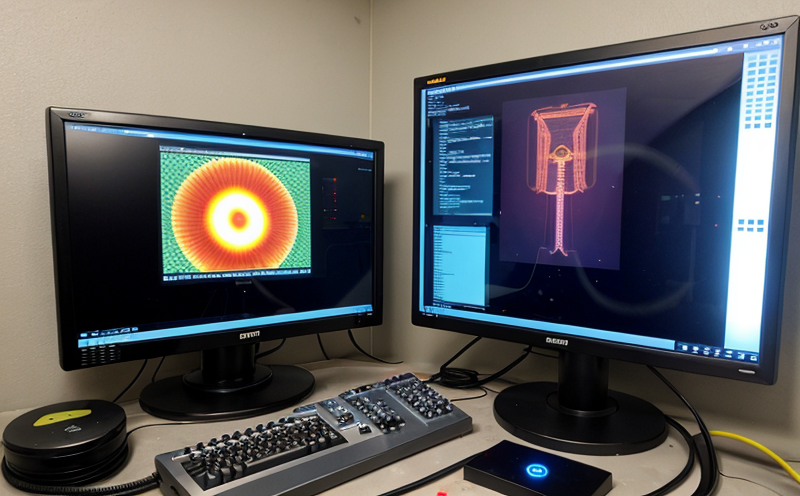UL 1283 EMC Testing for EMI Filters
The UL 1283 standard is an essential regulatory requirement for electromagnetic interference (EMI) filters. This service ensures that products meet the stringent criteria set by Underwriters Laboratories to prevent harmful emissions from electronic devices, which could disrupt or interfere with other systems and equipment. Compliance with this standard is mandatory for manufacturers aiming to market their EMI filters in North America.
The test evaluates the ability of an EMI filter to reduce electromagnetic interference (EMI) that may emanate from a device's internal circuits. By examining both conducted emissions and radiated emissions, UL 1283 ensures that products are safe for use without causing harmful interference. This service is particularly critical in industries such as telecommunications, medical devices, automotive electronics, and consumer electronics.
The testing process involves several stages, which include the following:
- Preparation of the EMI filter according to specified standards
- Conducted emissions testing using an electromagnetic compatibility (EMC) test chamber
- Radiated emissions testing in a controlled environment
- Analysis and interpretation of results against UL 1283 criteria
- Reporting and certification upon successful completion of the test
The scope of this service is extensive, encompassing various aspects of EMI filter design and performance. It ensures that the filters meet stringent safety requirements, thereby enhancing product reliability and reducing the risk of electromagnetic interference in complex electronic systems.
UL 1283 testing plays a pivotal role in safeguarding both consumer devices and industrial equipment from harmful emissions. By adhering to these standards, manufacturers can ensure their products are not only safe but also perform optimally in diverse environments. This service is particularly beneficial for companies looking to expand into the North American market or seeking to comply with international safety regulations.
For R&D engineers, this test provides invaluable insights into potential issues within EMI filters and allows for iterative improvements. Quality managers can leverage UL 1283 testing to ensure that their products meet stringent regulatory requirements, thereby enhancing brand reputation and consumer trust.
Why Choose This Test
- Regulatory Compliance: Ensures compliance with North American safety standards for EMI filters.
- Enhanced Reliability: Identifies potential issues early in the development process, improving product reliability.
- Innovation Support: Provides data that can be used to refine and improve filter designs.
- Market Access: Facilitates easier market entry into North American markets by meeting regulatory requirements.
The UL 1283 test is a critical component of any manufacturer's quality assurance program. It not only ensures that products meet stringent safety standards but also provides valuable data for continuous improvement and innovation. By choosing this service, companies can gain confidence in their product design and performance while reducing the risk of recalls or product failures.
Quality and Reliability Assurance
The UL 1283 test is integral to a comprehensive quality assurance program. It provides manufacturers with detailed insights into the performance of EMI filters, enabling them to make informed decisions about design improvements and material selection. By identifying potential issues early in the development process, this service helps prevent costly rework or product failures.
Quality managers can use UL 1283 test results to monitor production processes and ensure consistency across batches. This leads to more predictable performance and fewer quality control issues. For compliance officers, adherence to these standards demonstrates a commitment to safety and consumer protection, enhancing the company's reputation in the market.
The testing process itself is rigorous and involves multiple stages, each designed to identify specific areas of concern. Conducted emissions are tested using an EMC test chamber, while radiated emissions are evaluated in controlled environments. These tests ensure that all potential sources of interference are addressed, providing a comprehensive assessment of product performance.
Environmental and Sustainability Contributions
The UL 1283 test contributes significantly to environmental sustainability by promoting the use of EMI filters that minimize electromagnetic interference. By reducing harmful emissions, these filters help protect the environment from potential disruptions caused by electronic devices. This service also supports sustainable manufacturing practices by encouraging the development of safer and more reliable products.
Compliance with UL 1283 standards ensures that manufacturers are aware of their environmental impact and take steps to minimize it. This not only enhances corporate social responsibility but also contributes to a healthier environment for all users of electronic devices. The test results provide valuable data that can be used to develop more sustainable products, furthering the industry's commitment to environmental stewardship.
By focusing on compliance with UL 1283 standards, companies can contribute to a safer and more reliable world. This service not only ensures regulatory compliance but also promotes innovation in product design, leading to safer and more efficient electronic devices that minimize their impact on the environment.





